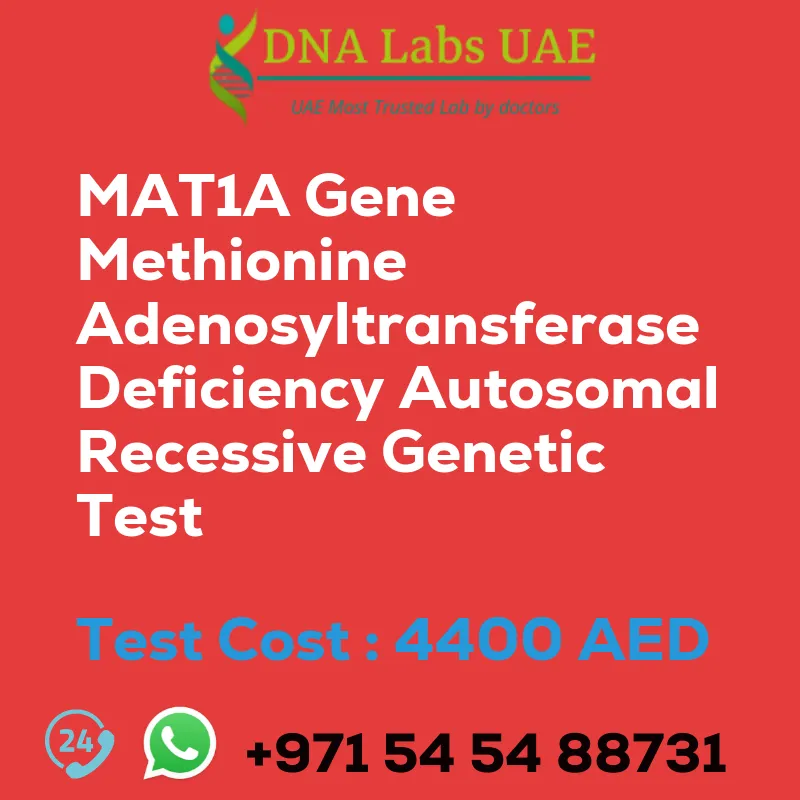MAT1A Gene Methionine Adenosyltransferase Deficiency Autosomal Recessive Genetic Test
Test Name: MAT1A Gene Methionine Adenosyltransferase Deficiency Autosomal Recessive Genetic Test
Components: Blood or Extracted DNA or One drop Blood on FTA Card
Price: 4400.0 AED
Sample Condition: Blood or Extracted DNA or One drop Blood on FTA Card
Report Delivery: 3 to 4 Weeks
Method: NGS Technology
Test Type: Neurological Disorders
Doctor: Neurologist
Test Department: Genetics
Pre Test Information: Clinical History of Patient who is going for MAT1A Gene Methionine Adenosyltransferase Deficiency, Autosomal Recessive NGS Genetic DNA Test. A Genetic Counselling session to draw a pedigree chart of family members affected with MAT1A Gene Methionine Adenosyltransferase Deficiency, Autosomal Recessive
Test Details
MAT1A gene methionine adenosyltransferase deficiency is a rare autosomal recessive disorder that affects the production of an enzyme called methionine adenosyltransferase (MAT). This enzyme is responsible for the synthesis of S-adenosylmethionine (SAMe), which is involved in various biochemical reactions in the body.
A genetic test using next-generation sequencing (NGS) can be performed to identify mutations or variants in the MAT1A gene. NGS is a high-throughput DNA sequencing technology that allows for the simultaneous analysis of multiple genes or the entire genome. This test can help in the diagnosis of MAT1A gene methionine adenosyltransferase deficiency by identifying specific genetic changes in the MAT1A gene that may be causing the disorder.
The test involves obtaining a DNA sample, usually through a blood sample or a cheek swab, from the individual suspected of having the condition. The DNA is then sequenced using NGS technology to identify any mutations or variants in the MAT1A gene.
The results of the test can help confirm the diagnosis and guide treatment options for affected individuals. It is important to note that genetic testing for MAT1A gene methionine adenosyltransferase deficiency is typically performed in specialized laboratories and requires a healthcare professional’s involvement. Genetic counseling may also be recommended to help individuals and families understand the implications of the test results and make informed decisions about their healthcare.
Overall, NGS genetic testing for MAT1A gene methionine adenosyltransferase deficiency can provide valuable information for diagnosis, treatment, and genetic counseling for individuals and families affected by this rare genetic disorder.
| Test Name | MAT1A Gene Methionine adenosyltransferase deficiency autosomal recessive Genetic Test |
|---|---|
| Components | |
| Price | 4400.0 AED |
| Sample Condition | Blood or Extracted DNA or One drop Blood on FTA Card o |
| Report Delivery | 3 to 4 Weeks |
| Method | NGS Technology |
| Test type | Neurological Disorders |
| Doctor | Neurologist |
| Test Department: | Genetics |
| Pre Test Information | Clinical History of Patient who is going for MAT1A Gene Methionine adenosyltransferase deficiency, autosomal recessive NGS Genetic DNA Test A Genetic Counselling session to draw a pedigree chart of family members affected with MAT1A Gene Methionine adenosyltransferase deficiency, autosomal recessive |
| Test Details |
MAT1A gene methionine adenosyltransferase deficiency is a rare autosomal recessive disorder that affects the production of an enzyme called methionine adenosyltransferase (MAT). This enzyme is responsible for the synthesis of S-adenosylmethionine (SAMe), which is involved in various biochemical reactions in the body. A genetic test using next-generation sequencing (NGS) can be performed to identify mutations or variants in the MAT1A gene. NGS is a high-throughput DNA sequencing technology that allows for the simultaneous analysis of multiple genes or the entire genome. This test can help in the diagnosis of MAT1A gene methionine adenosyltransferase deficiency by identifying specific genetic changes in the MAT1A gene that may be causing the disorder. The test involves obtaining a DNA sample, usually through a blood sample or a cheek swab, from the individual suspected of having the condition. The DNA is then sequenced using NGS technology to identify any mutations or variants in the MAT1A gene. The results of the test can help confirm the diagnosis and guide treatment options for affected individuals. It is important to note that genetic testing for MAT1A gene methionine adenosyltransferase deficiency is typically performed in specialized laboratories and requires a healthcare professional’s involvement. Genetic counseling may also be recommended to help individuals and families understand the implications of the test results and make informed decisions about their healthcare. Overall, NGS genetic testing for MAT1A gene methionine adenosyltransferase deficiency can provide valuable information for diagnosis, treatment, and genetic counseling for individuals and families affected by this rare genetic disorder. |







